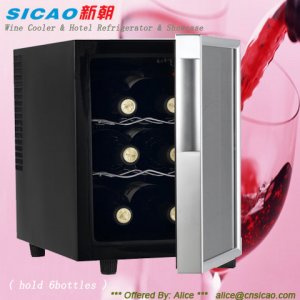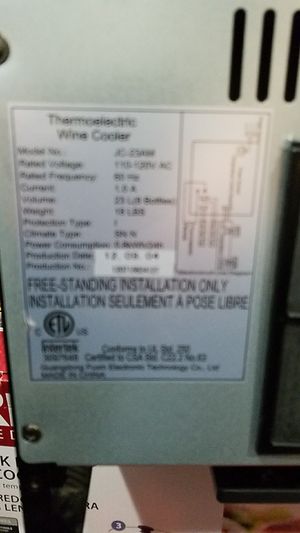While neither is inherently better than the other, it is important to understand the pros and cons of both thermoelectric and compressor wine refrigerators, so you can decide which is the best option for you. Below, we have outlined the benefits and drawbacks of both thermoelectric wine coolers and compressor wine coolers to help you make an educated decision when buying your unit.
The Benefits of Thermoelectric Cooling
There are a lot of reasons why one would choose a thermoelectric wine cooler over a compressor wine cooler. If these following points are important to you, you might want to put some serious thought into this option of wine storage and chilling.
- China Thermoelectric Cooler wholesale - Select 2020 high quality Thermoelectric Cooler products in best price from certified Chinese Water Cooler manufacturers, Wine Cooler suppliers, wholesalers and factory on Made-in-China.com.
- Ideal climate for preserving wine Wine should be stored at cool and consistent temperatures: about 12-18°C (55-65°F) for reds and 8-13°C (45-55°F) for whites. The Koolatron Urban Series 6 bottle Wine Cellar brings together functionality with great style and elegance to provide the perfect wine storage solution for any space.
- The basic principle behind thermoelectric cooling is known as the Peltier effect. It occurs when you run an electric current through two electrodes connected by a semi-conductor material, normally ceramic. The electricity creates a thermal imbalance within the device. One side gets warm while the other side gets cold. In a thermoelectric wine cooler.
Koolatron WC20 Thermoelectric Wine Cooler 20 Bottle Capacity with Digital Temperature Controls - Vibration-free and Quiet Cooling Power, 5 Removable Shelves, Black Amazon on sale for $197.99 original price $229.95 $ 197.99 $229.95.
Energy Efficient:
Because they have less moving parts and require much less power to operate, thermoelectric cooled wine refrigerators use much less energy than compressor cooled units. This feature not only benefits the customer, but the environment as well.

Quiet Operation:
Thermoelectric cooling requires very little movement from internal parts, so as a result, these units generate very little noise when in operation. This can be a desirable feature if you are prone to distraction due to the various noises your other kitchen appliances make.
Vibration-Free:

Unlike a traditional beverage refrigerator that hums and vibrates slightly, a thermoelectric cooled wine refrigerator doesn’t vibrate at all, which is great since any sort of jostling is bad for your wine. For this reason, thermoelectric wine coolers create a favorable environment for your wine, especially if you plan to age them for a significant amount of time.
The Drawbacks of Thermoelectric Cooling
That being said, thermoelectric wine coolers do come with their drawbacks. Look over the following points to determine if any of these negatives will significantly impact your decision to choose this type of cooling.
Small Capacities Only:
Thermoelectric cooling is not as powerful as compressor cooling, so it is only suitable for wine refrigerators that have a small capacity. This means that if you have a large amount of bottles that you want to cool, you might end up spending more money on more wine coolers instead of having a single dedicated unit that can hold everything.
Heat Sensitive:
Thermoelectric cooling is not the best for unstable or extra warm environments. A high ambient temperature will significantly hinder the cooling capacity of a thermoelectric wine refrigerator. Consider this point if you plan on keeping your wine cooler in an area that doesn’t keep a consistent temperature, such as a basement or an attic.
Expensive Operation:
Even though thermoelectric wine coolers use significantly less energy than compressor wine coolers, it is worth noting that thermoelectric wine coolers are on all of the time, which can end up costing more money than you might anticipate. Compressor wine coolers, by comparison, only turn on when necessary.
The Benefits of Compressor Cooling
Compressor wine coolers offer their own set of positives. Keep in mind the following points to help guide your search for a new wine cooler.
Powerful Operation:
Compressor cooled wine refrigerators have a much more powerful cooling capacity than thermoelectric wine refrigerators, which is why most built-in units use a compressor. This is also the reason you’ll see more large-capacity units with compressor cooling functions.
Intertek Thermoelectric Wine Cooler Jc-23am Manual
Handles High Capacities:
Because of its powerful cooling, compressor cooling can handle wine refrigerators that have large wine bottle capacities. This is ideal for people with large wine collections or full wine cellars.
Adapts to Environmental Stress:
Compressor cooled wine refrigerators can better adapt to varying temperatures and extra heat loads, keeping a stable internal temperature despite environmental conditions. Consider this feature if you plan to keep your bottles in your basement or another uninsulated area.
The Drawbacks of Compressor Cooling

Thermoelectric Wine Cooler Jc-23am Manual
Compressor wine coolers do have their negatives. If you feel any of the following features will significantly impact your experience, consider using a thermoelectric wine cooler instead.

Small Vibrations:
Because a compressor has many moving parts and can cycle on and off, compressor cooled wine refrigerators sometimes vibrate slightly. Most units account for this by using rubber brushing to absorb the slight movement.
Slight Noise Output:
Again, because of the moving components, compressor cooled wine refrigerators will give off some noise. This noise is the same as — if not softer than — the hum of your typical refrigerator. Rubber brushing is also used to absorb and diminish this compressor output.
Which is the Best Option for You?
In order to determine which wine cooler is best for your needs, you’ll have to pinpoint what your future wine cooler’s primary function will be. If you need storage for a case of wine, give or take a few bottles, a thermoelectric wine refrigerator will be the perfect option for you. If you’re looking to store a large collection for a longer amount of time, a compressor wine cooler will suit you best.
Also, if you want to build your wine cooler into your cabinetry or store it under a counter, you will be better off with a compressor cooled unit. To put it simply, you can count on thermoelectric wine coolers to be smaller capacity, meaning they will likely be freestanding units, while you can count on compressor wine coolers to be larger capacity and likely to be built-in units. This is especially important to remember if you are remodeling your kitchen to include your new purchase. That being said, remember that it is always possible to make any unit work in almost any space.
